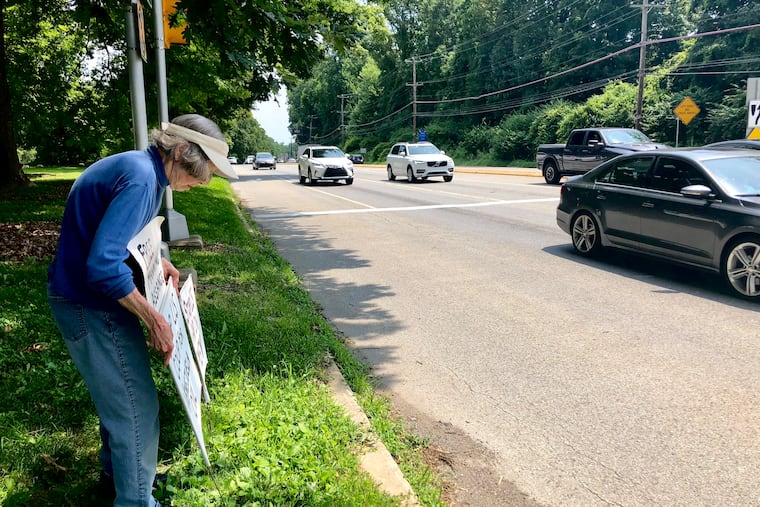At 85, she holds daily antiwar protests along busy Route 1 in Chester County
When she was younger, Joan Nicholson was convicted of ransacking the offices of the Selective Service, FBI, and U.S. Attorney in upstate New York. She’s still a rabblerouser, in a different way.

Joan Nicholson roused at 7 a.m., donned a blue turtleneck, jeans, and cream-colored visor in the July heat, ate her usual breakfast of cereal, an egg, and sprouted-wheat toast, then headed to the side of Route 1 in Kennett Square.
There she would quietly stand — as she normally does — for the next two hours, accompanied by her three handmade picket signs denouncing U.S. involvement in global conflicts. She’s 85. And she’s been at this for the last 11 summers.
She’s become a fixture among locals, if a somewhat cryptic one. Her largest sign, and the only one she holds in her hands instead of staking in the ground, reads: “Stop U.S. Wars for Profit Plunder Worldwide.”
“I’m out here for about two hours every day in the summer,” said Nicholson, who wears a face mask that shields her nose and mouth from the car exhaust on Route 1. “And in the winter, for about an hour-and-a-half.”
Her posters have evolved with current events, but largely hew to beliefs she holds firm: Peace, always. No war, no prisons. Justice.
“Stop U.S. War on Yemen,” one of her signs, drawn neatly in marker, reads. Others: “Stop U.S. Coup for Venezuela Oil." “Free Manning, Assange," a reference to Chelsea Manning, a former U.S. soldier convicted six years ago of leaking around 750,000 sensitive documents to WikiLeaks, and Julian Assange, the founder of WikiLeaks who published the material.
Reaction to her silent protest is mixed. Some cars slow slightly to take in the uncommon tableau, which Nicholson has established on a strip of grass between the Old Kennett Meetinghouse and The Kendal at Longwood retirement community, where she lives. Others honk, as greeting, as support, or both. (She responds with a breezy peace sign.) Then there are the single-finger salutes, the acts of hostility. (“Poor souls,” Nicholson says nonchalantly.)
Many passing commuters are unfazed and others, curious. One reader submitted a question to Curious Philly, The Inquirer’s question-and-answer forum, asking, essentially, what’s her story?
Nicholson, a Pennsylvania-born Quaker raised in Rose Valley and an ardent anti-Vietnam War activist, was one of eight people who broke into the federal building in Rochester, N.Y. decades ago. In the middle of the night on Sept. 6, 1970, they ransacked the offices of the Selective Service, FBI, and U.S. Attorney and destroyed Vietnam War draft cards. The group called itself the Flower City Conspiracy — a nod to the city where it committed the headline-grabbing crime — and was convicted that December in the Western District of New York. The majority of the Flower City Conspiracy members, Nicholson included, represented themselves in court.
“We presented the Vietnam War to the jury,” Nicholson said, holding her thin, deeply veined hands in her lap on a recent day as she sat at a picnic table at the Old Kennett Meetinghouse. “We told them what was happening. And then the jury asked the judge whether they could recommend leniency.”
Nicholson, then 36, was sentenced to up to 30 months in federal prison, but ended up spending about a year at a minimum-security federal prison camp in Alderson, W.Va., she said.
She served her time, then wandered, just as she had always done. She worked a stint as a vacation Bible study teacher in Georgia, visited Washington and other parts of the East Coast, then traveled to Nicaragua, Vietnam, and Pakistan.
Nicholson attended Earlham College, a Quaker liberal arts school in Richmond, Ind., where she graduated with a degree in history in 1956, then took graduate courses for about a year at the University of Pennsylvania.
She was arrested several times over the years, including for standing on the steps of the U.S. Capitol and reading aloud the names of the Vietnam War dead. She appealed the unconstitutionality of those arrests, and the District of Columbia Court of Appeals ultimately ruled in her favor in 1970.
“I have been so fortunate," she said.
In 2005, Nicholson, then in her 70s, moved to The Kendal. Two years in, she felt the familiar hankering of wanting to do something — anything — in activism. She didn’t have a car, so she didn’t have the freedom to travel the way she once had. Instead, she started making her signs and bringing them to the side of the highway.
For more than a decade now, the signs — along with various rallies and protests — have been the focus of her attention, leaving her little time for much else.
Asked about her hobbies, she said she likes music.
But considering the news and the global crises that inspire her signs, she asked, “How can we sing?”